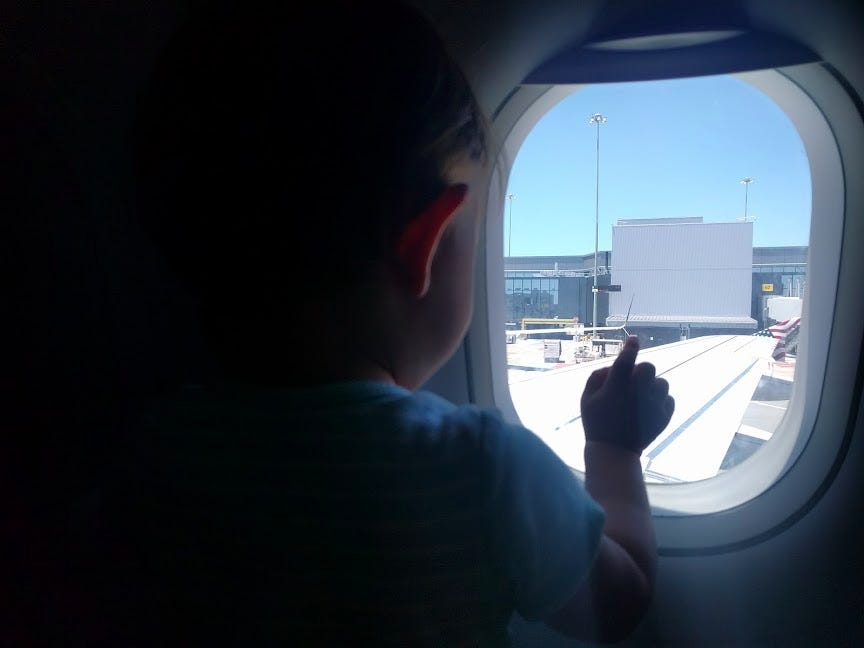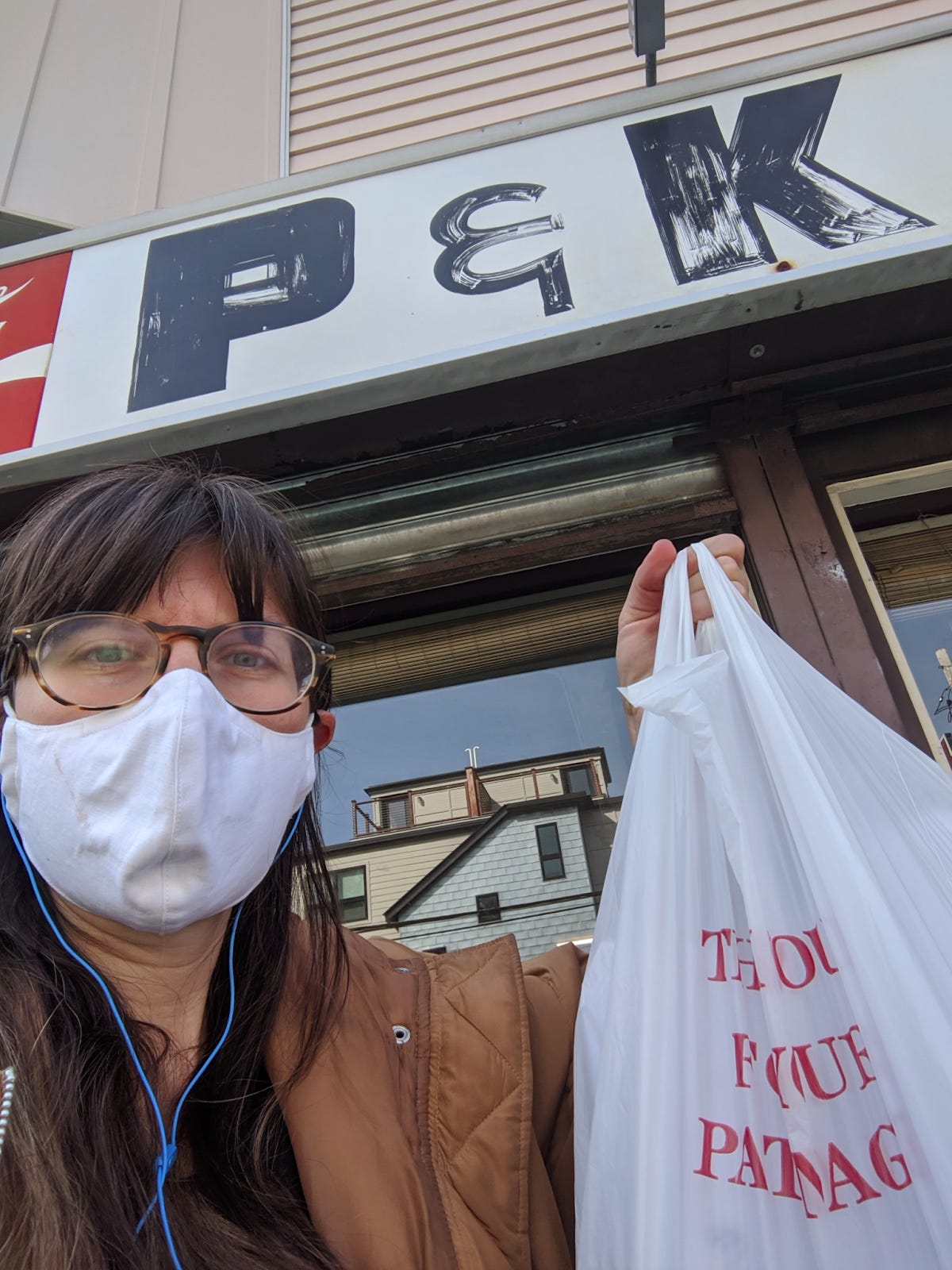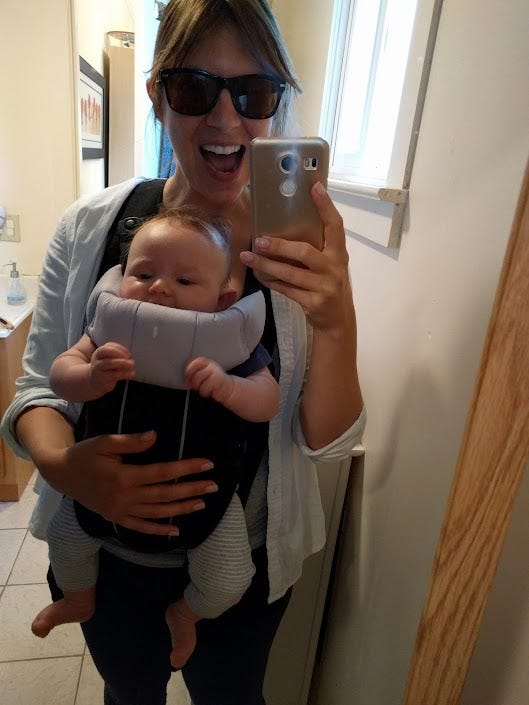The cultural importance of the “sub sandwich”
J/K, 5 questions on ADHD for educational psychologist Dr. Sarah Wheeler
Sarah and I share a backyard fence in Oakland. For many years I would hear her talking on the phone very loudly (she is not a wilting flower) and wonder about her life. Who was that lady behind the peach tree? She clearly had a gift for gab and friendship. The rhythm of her conversations was punctuated by lots of laughter. There was joy there. Lots of connection. But being mostly an introvert myself, and being sort of buried under the new role of motherhood, I never sought out the answer to my question.
Then a neighbor introduced me to “the lady behind the peach tree” and, holy moly, were my eavesdropping hypotheses right on. I remember this moment in our early friendship when we were trimming the tree in the driveway side by side and it began to dawn on me that this was going to be one of my people. This kept dawning on me. And then covid hit. And I don’t know if you experienced this, but apocalypse has been a very beautiful time for forming no-bullshit friendship.
It wasn’t just that we passed cups of milk and glue guns and whatever else one might need from a neighbor over the fence. It was that we also leaned on one another during migraine headaches and overwhelm and heartbreak. Sarah is the person who drank a beer with me when my friend died. She’s the one who texts me, “Any small triumphs today?” She knows my kids’ essences and shows up for them accordingly—something far deeper than just pitching in on childcare. She’s unconditional loving and generous and smart as hell. She’s an incredible writer. And on top of ALL of this, she’s taught me so much about disability—one of her professional expertises, but also her lived experience. So during this, ADHD Awareness Month, I wanted you to learn from her, too. Pretend you’re eavesdropping over the fence…
Courtney Martin: In your incredible piece on your own ADHD diagnosis, you describe it this way: “It is not inattention, in fact, but over attention. Misallocation of attentional resources. An inability to accurately rank the importance of a crucial professional correspondence and an email advertising a sale on dish towels.” It got me thinking...who determines accuracy here? Like how much of this is socially constructed--we live in a country that tells people that email=productivity and it is IMPORTANT and your dish towels are girly and unimportant?
Sarah Wheeler: First off, for the record, my dish towels, the product of many many hours of pointed procrastination, have more of a masculine, “I only enter the kitchen to slice enormous pieces of meat with my big knife” vibe.
I got diagnosed at 37. Years before that, I was a 22-year-old special education teacher who was in love with my ADHD students and wanting desperately to understand their brains, which I realized now was a safer path to understanding my own. One of the terms I picked up in that early education was “saliency determination,” this idea that the ADHD mind takes everything in at a similar volume - rather than automatically parsing out the things that should, perhaps by some social-constructed definition, as you say, be loudest. I do think that even in the past 10 years, the things we’re exposed to daily, the endless litany of tailored and very effective attention grabbers (say, dish towels), make knowing what is salient, or prioritizing amongst so many salient things, very, very difficult for everyone. So, the distraction is real for all of us.
But yes to the arbitrary definition of what is worthy and not worthy There is a real skew towards productivity, and a real shame around distraction or “lack of discipline” in our culture. You could call this the capitalist psyche, you also see it described as a “white supremacist value,” and in the disability and neurodiversity world it’s referred to as “internalized ableism.” Professionally, I’ve been trained to “fix” ADHD in others, so I often have to think about whether the ideas I’m telling myself about my ADHD are coming from that “medical model” I was trained in, where things like ADHD are disorders needing to be identified and fixed, and how much of it is truly getting in the way of my own happiness.
You also write a lot about being a mom with ADHD. What’s the hardest part of that intersection and what’s the gift of it?
Well, I’ve only been a mom with ADHD, so it’s often hard for me to know exactly how it’s different for others. I think a lot of the themes are the same, but the intensity is just turned up a bit higher. For a lot of mother’s with ADHD, it’s a real struggle to be held up against these already ridiculous standards about what a mother should be. Packing the diaper bag, signing the field trip form, doing the laundry, these things that fathers often just get a pass on, are already not the strengths of many women with ADHD. Many of us are actually better suited to be the breadwinners, the work-trip-takers, than the stay-at-home crust-cutters. The less binary parental roles become, the better for ADHD mamas.
Emotional and sensory regulation are often big pressure points for ADHD moms. Many of us tend to feel what others feel, and get overwhelmed easily when there’s too much going on that isn’t our favorite stuff, just the way we like it (I’m never overwhelmed, say, shopping alone at Target at 9pm, listening to Usher). When my kids flip out, I flip out too. When my three-year-old screams, I feel like my brain is being torn apart. Again,nobody enjoys these experiences, but as I learn more about my own ADHD I get better at thinking about my responses as reactions to my own dysregulation or overload, rather than what my kids are actually doing, even though, of course, they are sometimes real shitheads.
There are many gifts, the spirit of adventure, the ability to go all in or “hyperfocus” (as the white coats would say) on some of my kids interests, like the entire week we spent pretending we lived in the Arctic. But I would say the greatest gift is having more opportunities to model and talk to my kid about the imperfection of human beings and the vast diversity of the human mind. I wrote about the importance of talking to kids about ableism, which I feel very strongly about, here, and my ADHD gives me lots of fodder for that. My 5-year-old son said to me the other day, “Mama, you are very forgetful, but you’re still a great mama!”
Children need to know that there is no one way they need to be in the world in order to be of value.

How do you experience ADHD as affecting your creative process?
Um, a lot? I’ve been fighting against the part of me that fights against routine my whole life. As a writer, you often hear that you just have to get up every morning, make yourself do it, be DISCIPLINED. Well, with my ADHD diagnosis, I finally gave all that up. I am still a believer in the “just get words on the page” and the “if you build it they will come” philosophies of creation, but I also get that that’s not how I roll.
The Eat-Pray-Love lady talks about how people used to believe artists had, like, little fairies or demons that dropped in when they pleased and shoved this holy work through them, and that pretty much describes my experience writing. When I’ve thought about something enough to be ready to write about it, I have to notice that it’s time, and if I do that, then I lose myself in it until it’s passed through me.
This makes things like writer’s block or the editing process sometimes very painful, but I find most of my work can flow pretty well if I can give the fairies attention when they come, which, back to the mom thing, is not easy. But I also have to have pretty unstructured, free days, lots of inspiring shit happening around me, and it doesn’t always work like that.
What can people without ADHD do to make life easier, more joyful, less judgmental for the folks with it in their lives?
Just asking that question does what psychologists call “intervention by assessment” - makes it better just by bringing it up. One thing, as with all neurodivergent folks, is giving us the space to “drop our masks” from time to tim. Let us monologue about the cultural importance of the “sub sandwich” (high) or take all of the paintings off of the walls in a mania or totally drop the ball or forget to switch the stupid laundry, because, well anything is more interesting than that. Just not taking it personally, forgiving mistakes, and picking your battles with the ADHDers in your life is a grace.

You are funny as fuck. Do you think this has to do with your ADHD, in part?
Actually, I’ve been waking up at 5am to build my sense of humor in a very disciplined way since I was like, 15! For real, yes, thank you and I think so. The flipside of over-attention, or not having good saliency determination, is that while you miss some things (that field trip form, the important comment your boss made about your performance, that curb that came out of NOWHERE), you pick up on lots of tiny details others miss or disregard. So to me, a lot of my humor comes from connecting things I’m hearing or calling back to other things people forgot about because they were doing such a good job paying attention to the next thing. And making people laugh really gets my dopamine popping - it’s like, the opposite of laundry.
Don’t forget to subscribe to Sarah’s newsletter! Here’s her latest post on her favorite ADHD things.
We are collectively giving to the Disability Disability Project in her honor.





Saliency determination. I feel very uggh about this phrase and also incredibly excited to be able to connect it to my understanding of autistic attention, which is often wide and dispersed and inclusive. I think that kind of attention is a form of love, a way of caring for and about the world in a way that is not easily reoriented by the violent demands of capitalist production and pace. I like thinking of saliency as something us ADHDers are spreading, expanding, weirding out. Where you put your attention is where you put your energy. Is it better spent propping up a racist and ableist hegemony or reaffirming the unlikeliness of that oak over there, its ability to survive, to spiral out and offer the gift of shade?
I love that two of my favorite substack writers are friends and neighbors. Wish I lived in your neighborhood too -- I have so much I'd love to discuss with both of you. Thank you for this post and for your wise and insightful writing.